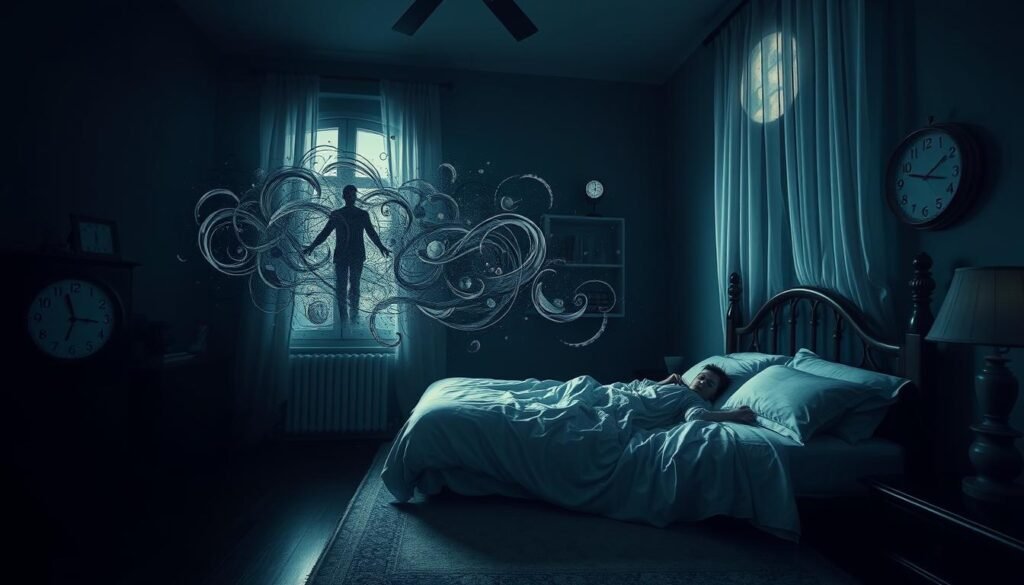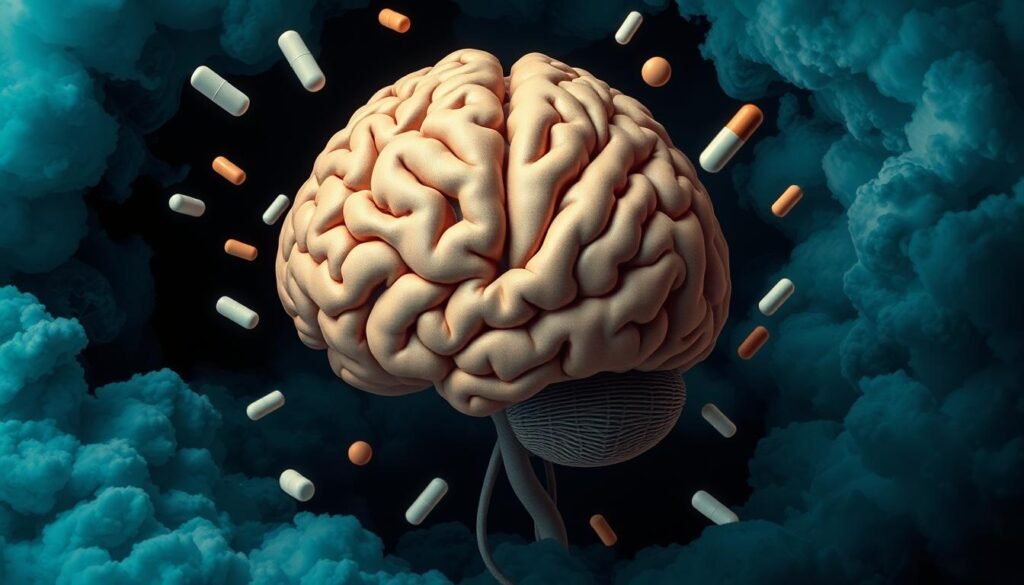Did you know up to 12% of patients report insomnia when taking escitalopram for anxiety? This fact highlights the important influence this antidepressant can have on sleep. Being a selective serotonin reuptake inhibitor (SSRI), escitalopram treats depression and anxiety. But, it might also lead to sleep difficulties for some. Knowing if escitalopram causes insomnia is key for users and healthcare providers when creating treatment plans.
This guide delves into the link between escitalopram and sleep issues, showing common sleep problems it may cause. Acknowledging these potential problems helps people make better decisions. They can then manage their sleep more effectively. For deeper understanding, here’s a great resource to explore.
Key Takeaways
- Escitalopram may cause insomnia in a notable percentage of users.
- Understanding sleep disturbances can help manage escitalopram’s side effects.
- Proactive measures, such as medication timing, can improve sleep quality.
- Life changes play a critical role in alleviating escitalopram-induced insomnia.
- Consulting a healthcare provider is essential for managing persistent sleep issues.
Understanding Escitaloprám and Its Purpose
Escitalopram is known by its brand name, Lexapro. It helps treat mental health issues. It’s mainly used for major depressive disorder (MDD) and generalized anxiety disorder (GAD). Because of this, many doctors recommend it.
This drug is a selective serotonin reuptake inhibitor (SSRI). It boosts serotonin levels in the brain. This can better mood and lessen anxiety. The FDA has approved its use for adults and teens between 12 and 17 years. It’s good for both starting and ongoing treatment.
Escitalopram is also helpful for other problems beyond its main uses. These problems include social anxiety, obsessive-compulsive disorder, and more. It’s important to know the right escitalopram dosage for insomnia. This is because of the side effects it might have.
Doctors usually start treatment with 10 mg once a day. They change the dose based on what the patient needs. For sleep issues, they might adjust the escitalopram dosage for insomnia. They aim to find a dose that works well and feels right.
The drug’s effects are predictable, making it easier to know how it will work. However, some people may have side effects like insomnia. Even with these concerns, escitalopram helps improve mental health. Patients must work with their doctor to get the dose right. This helps reduce sleep problems.
Does Escitaloprám Cause Insomnia?

Escitalopram is a widely used antidepressant. People often wonder if it affects their sleep. Users report problems like trouble falling asleep, staying asleep, and early morning wakeups during treatment.
Common Sleep Problems Associated with Escitaloprám
Those on escitalopram often face sleep issues. They struggle with:
- Difficulties falling asleep
- Frequent awakenings during the night
- Waking up too early in the morning
- Feeling unrefreshed upon waking
Insomnia from escitalopram can disrupt daily life. It can make you less focused and more irritable. If you’re having these sleep troubles, look into ways to manage them while on your medication.
Statistics on Insomnia Rates Among Users
Insomnia is common among those taking escitalopram. More than 10% of users might get insomnia as a side effect. This issue affects many people’s lives greatly.
Studies say sleep problems are 5% more common in escitalopram users than those on a placebo. Sleep issues usually get better after the first few weeks. However, for some, they last longer. If you’re struggling with sleep, here’s a helpful guide.
Escitaloprám and Sleep Disorders

Escitaloprám is often used to help with anxiety and depression. But, it can lead to escitalopram side effects such as insomnia. This makes treatment harder because mental health problems can also disturb sleep. It’s important to know how escitalopram-induced insomnia and mental health issues can overlap for better management.
Statistics show concerns about sleep. For example, around 37.6% of women have mild insomnia, whereas 26.8% suffer from it moderately. About 5.9% of women deal with severe insomnia. Also, 40% of women say they have poor sleep overall. Despite these issues, studies offer hope. By the eighth week of using escitalopram, many reported better sleep and fewer insomnia symptoms. Actually, 50% mentioned better sleep, compared to 35.4% taking a placebo.
People on escitalopram might feel more than just insomnia. They also report feeling tired and sick. About 5% more of those with major depressive disorder mentioned these issues than those on a placebo. Most users see sleep get better after one to two weeks. Yet, some may take up to four weeks. Changing habits, like when you have caffeine, can help manage escitalopram-induced insomnia. Try not to have caffeine six hours before going to bed to sleep better.
Speak with a healthcare provider if insomnia doesn’t improve. This is vital if it’s affecting your daily life. Being aware of any severe reactions to escitalopram can help you choose the right treatment and get more support.
The Pharmacology of Escitaloprám

Escitalopram is known as a powerful selective serotonin reuptake inhibitor (SSRI). It is vital in treating depression and generalized anxiety disorder. By boosting serotonin in the brain, it helps steady mood. This change in serotonin also links to how escitalopram affects sleep issues.
How Escitaloprám Affects Serotonin Levels
Raising serotonin levels significantly alters mood and sleep patterns. Side effects of escitalopram can change how we sleep due to hormone shifts. Increased serotonin usually makes us feel better. Yet, it might cause insomnia for some, particularly teens and young adults.
This age group may also feel more upset, irritable, or have trouble sleeping as they get used to the drug. The risk of serotonin syndrome is also important to note. This dangerous condition happens when escitalopram mixes with other drugs that impact serotonin. It can cause anxiety, confusion, and heart issues. This shows why it’s crucial to watch serotonin levels while on this medication.
Stopping escitalopram suddenly can lead to withdrawal. Symptoms include more anxiety and sleep problems. This highlights the importance of a well-thought-out treatment approach.
Knowing the pharmacology of escitalopram helps us see its role. It can both treat and cause sleep issues.
How to Manage Escitaloprám-Induced Insomnia
Many find it hard to sleep with escitalopram. But, you can make sleep better by using some strategies. It’s all about knowing the best practices for taking escitalopram and changing your lifestyle to sleep well.
Best Practices for Taking Escitalopram
When you take your medication matters for sleep. Taking escitalopram in the morning could lead to less wakefulness at night. Always use the amount your doctor says to avoid problems when stopping the drug. About 5% of escitalopram users have trouble sleeping, mostly in the beginning. Research says sleep gets better from the second to fourth week for new users.
Lifestyle Changes to Minimize Sleep Disruptions
Changing how you live can also help you sleep without interruptions. You should:
- Maintain a consistent sleep schedule by going to bed and waking up at the same time daily.
- Create a comfortable sleep environment—dark, quiet, and cool spaces promote better sleep.
- Avoid caffeine and alcohol, particularly in the hours leading up to bedtime.
- Engage in regular exercise, which can help to enhance overall sleep quality.
- Practice good sleep hygiene, including relaxation techniques like deep breathing or meditation.
Using these tips can help those on escitalopram improve their sleep. It’s a key part of managing depression treatment.
Potential Side Effects of Escitaloprám
Knowing about escitalopram side effects is vital for those thinking about this medicine. It can help with depression and anxiety but has possible side effects. Insomnia is often reported by users as a common issue. It’s key to know these effects vary in how severe they are and their impact.
Common Adverse Reactions
Some common side effects of escitalopram include:
- Fatigue and tiredness
- Insomnia or disrupted sleep patterns
- Nausea
- Increased sweating
- Headaches
- Dry mouth
- Changes in appetite
- Sexual side effects
- Constipation or diarrhea
- Mild allergic reactions
These effects may be stronger when starting the medication. This is while the body gets used to it.
Comparative Side Effects of Other Antidepressants
When we compare escitalopram with other SSRIs, there are both similarities and differences. Here is a look at escitalopram and some other SSRIs’ side effects:
| Medication | Common Side Effects | Insomnia |
|---|---|---|
| Escitalopram | Fatigue, nausea, headaches, sexual dysfunction | Common |
| Fluoxetine | Jitteriness, insomnia, nausea, headache | Common |
| Citalopram | Dry mouth, nausea, fatigue, drowsiness | Less common |
| Paroxetine | Weight gain, sexual side effects, nausea | Common |
Insomnia is a common risk with escitalopram, but it can vary with other meds. Talking to a healthcare pro can help manage these risks well.
The Relationship Between Antidepressants and Insomnia
Many patients treated for mental health disorders report trouble sleeping due to antidepressants. Drugs like escitalopram can disturb sleep. Nearly 75% of adults who feel depressed also struggle with insomnia. This shows how closely sleep and mood disorders are linked.
Escitalopram, or Lexapro, treats depression and anxiety. But, it can lead to insomnia in some people. Over 10% of those taking it report sleep problems. These issues add more stress to those already dealing with depression and anxiety.
Studies have looked into how escitalopram affects sleep. For some, it worsens insomnia, but it can also improve it, especially in perimenopausal and postmenopausal women. This makes it hard for doctors to decide on the best treatment.
Antidepressants work differently for everyone. While they may help some sleep better, they might do the opposite for others. Tailoring the approach to tackle insomnia is key. Doctors might need to change the drug dosage or try other medicines. Good sleep habits also help in reducing sleep problems.
With more people in the U.S. being prescribed escitalopram, it’s important to understand its impact on sleep. Since insomnia can deeply affect mental health, finding ways to manage it is crucial for patient health.
Consulting Your Healthcare Provider About Sleep Issues
If you’re having trouble sleeping while on escitalopram, talk to your healthcare provider. Don’t ignore ongoing insomnia or worsening signs. Checking in with your doctor can lead to the right adjustments in your treatment.
When to Seek Medical Advice
Knowing when to ask for medical advice is key to your health. Consider these cases:
- If insomnia lasts more than two weeks, despite lifestyle changes.
- When you feel more irritable, nauseous, or more anxious.
- Seeing mood changes or more depressive signs.
- If sleep problems affect your daily life or happiness.
Talking to your healthcare provider early helps you get care that fits your needs. They might change your medication or suggest new ways to manage. Reading about dealing with sleep issues can also help.
Conclusion
Lexapro, or escitalopram, is a common drug for depression and anxiety. It plays a key role in treatment. But, its effect on sleep is a concern. Some people might experience sleep issues like insomnia while on it.
These sleep issues vary from person to person. In some, escitalopram may help reduce waking up at night and improve sleep. Yet, it could still mess with REM sleep and change how well you sleep overall.
It’s important to understand how escitalopram influences sleep if you’re taking it. The way it might cause insomnia involves serotonin, which affects both mood and sleep. Knowing this, people should watch their sleep habits and make changes if needed.
If insomnia occurs because of escitalopram, talking to a doctor is crucial. They might tweak the dosage or suggest ways to better your sleep. This helps balance the benefits of Lexapro with managing sleep problems, improving overall health.